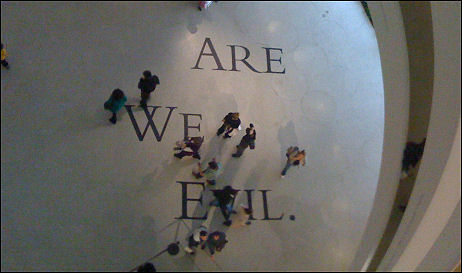Asked by the N.Y. Times‘ Deborah Solomon about Barack Obama‘s choice of Rahm Emanuel as chief of staff, Karl Rove replies as follows: “I raised a question as to whether this would be the best use of Emanuel’s talents. If you’re trying to work through a big legislative priority, it is sort of hard if you have a guy who has a reputation as a tough, hard, take-no-prisoners, head-in-your-face, scream-and-shout, send-them-a-dead-fish partisan.”
My Kid Could Do That

Floating in a small indoor pool in the Guggenheim’s main lobby.
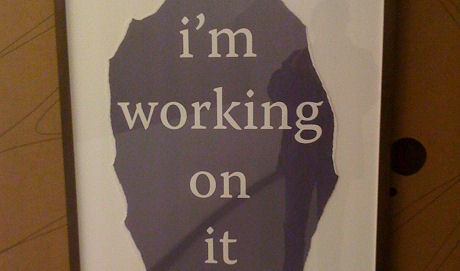
Saturday, 11.15, 3:55 pm
Crowd Roars
Slumdog Millionaire‘s Danny Boyle narrating a N.Y. Times still-montage piece about the shooting of his film last year in India.

Taped to ticket window in lower Manhattan’s Angelika Film Center — Saturday, 11.15, 7:15 pm.
Australia Upgrade
Australia’s website has been revamped and re-launched. It may be the most fluidly visual and eye-candy-ish movie site I’ve ever laid eyes on. Some 200 pics from the film, 20-plus short clips, interactive, whistles and bells.
Drizzly
The weather, I mean. An excellent museum and movie-watching day.

Late to the Table
There’s a certain distinction in being the absolute last Hollywood-feeding site to post the new Watchmen trailer. The truth is that I was too lazy to get around to it until now.
Gomorrah’s Garrone
I’ve seen Matteo Garrone‘s Gamorrah twice now and could easily roll with a third viewing. That’s a signification admission for a film as pointedly verite and rigorously un-“dramatic” (in the Godfather sense of that term) as this one. But I’ve fallen for the immersive, un-performed, you-are-there atmosphere that Garrone has fastidiously chosen and created, and my respect for it (and the film, obviously) has grown with each new refresh.
I spoke with Garrone last Monday on the phone. He was in a car somewhere in Los Angeles. The big American Cinematheque screening and after-party at Ago happened the following night. Sorry I wasn’t there.
The film is about the Camorra, or the Italian mafia, which is based in and around Naples. I got within shouting distance of this rancid city during an Italian trip I took with Jett in late May ’07. Talk about a scuzzy environment. The piles of rotting garbage, a result of a ridiculous longtime strike as well as organized crime’s influence upon the situation, were everywhere. I couldn’t get out of the region fast enough.
Gamorrah is based on a best-selling book by Roberto Saviano and Virginia Jewiss.
So far it has a 100% rating on Rotten Tomatoes. It opens sometime next month.
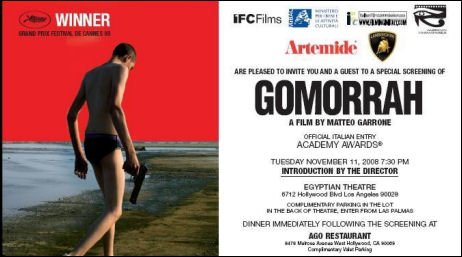
Curtis Burns On
“Tony Curtis‘ Hollywood heyday is long gone,” I wrote eight and half years ago for my Reel.com column, “but there’s no mistaking the fact he’s always embodied a certain pugnacious cool [that’s] as palpable today as it was when Curtis was starting to come into his own as an actor, in the late 1950s.
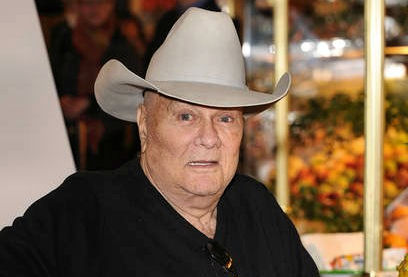
“Forget all the cruddy movies he’s made over the last 20 years. And forget his smooth-talking seducer-stud roles, which he began playing in the early ’60s in big-studio disposables like Sex and the Single Girl, Boeing Boeing, The Great Race, and Not with My Wife, You Don’t!
“I’m talking Sidney Falco cool. A pensive, anxious, urban quality. You can see shades of it in Curtis’ saxophone-playing Joe in Some Like It Hot. In his performances in Lepke, The Outsider, The Defiant Ones, The Great Impostor. But especially noticeable in the erstwhile Mr. Falco — a profoundly scummy New York press agent he played in the blistering 1957 drama Sweet Smell of Success.
“Bluntness, ambition, class resentment, latent anger — these are fires that have always burned within Curtis, the man. I had coffee with the 74-year-old actor last Sunday [in March 200] and it seems to me they’re still there. (Nowhere near as toxic, of course. Age modifies everything.) Their manifestation in Sidney 43 years ago, when these stored-in-the-gut feelings were riper and more intense, made for a perfect match — the sort of synchronicity that happens once in a blue Hollywood moon.”
I’m bringing this up to remind everyone that Curtis is not — or wasn’t, at least — a guy given to softball platitudes and sanding off the edges. And yet he’s been accused by Michael Korda of doing more or less that in his recently published autobiography, American Prince.
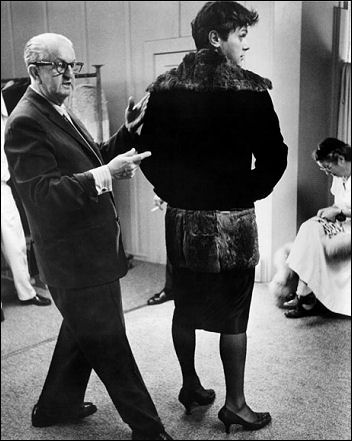
In a Daily Beast article called “Some Like It Dull,” Korda says that American Prince constains “lots of names, lots of pals from the old Ratpack days, lots women, lots of marriages, lots of children, a frank account of Curtis’s cocaine addiction (at one point he tried to sail through H. M. Customs on landing at Heathrow with a .38 revolver and a bag of marijuana in his luggage).
“But the spirit, the anger, the determination to tell his side of the story that marked, say, Kirk Douglas’s memoir, are all lacking. The book ought to be fun, the stories of high jinks on and off the set are there, but instead of being high-spirited and outrageous they are somehow dull and boring. There is more than enough shtupping, but Curtis (or perhaps his ghost-writer) isn’t able to make it seem sexy and exciting and fun, indeed it seems thrown in as if somebody had said, ‘It needs more shtupping, if it’s going to sell.’
“But that’s not what it needed, really. It needed a certain good humored grace, and an earthy appreciation for a good life well lived (and to hell with what other people say or think), and the sense that in old age the author at last knows who he or she really is. When you think about it, just the qualities that Joan Collins showed in her memoir, and which led Tony Curtis to call her ‘a cunt’ on the set of The Persuaders. (He didn’t like Shelley Winters, either, but it has to be said that her memoirs were a lot gutsier and funnier than his.)”
“That’s really the problem with the book. The one thing a movie star memoir has to be is fun — it doesn’t have to be true (few of them are that), or fair to ex-wives or husbands or old lovers (few of them are that either), but it does need to be fun, to lift us out of the humdrum problems of our own life for a few hours, and, alas, American Prince is no fun at all.”
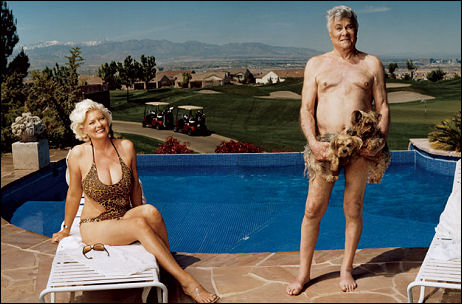
Funny, but Korda’s review makes me want to pick up a copy. Because Curtis didn’t equivocate or dull-out or play namby-pamby games with me eight years ago. Maybe he chose the wrong ghost-writer; maybe he should have chosen me instead. (Not that I would have had the time.)
The only negative feeling I have about Curtis is that quote he gave to Fox News’ Bill McCuddy dissing Brokeback Mountain, during which he said “he hadn’t yet seen Brokeback Mountain and had no intention of doing so. He claims that other Academy members feel similarly.
“‘This picture is not as important as we make it. It’s nothing unique. The only thing unique about it is they put it on the screen. And they make ’em [gay] cowboys.’ Curtis reminded folks that his contemporaries wouldn’t have cared for the highly acclaimed Best Picture nominee. ‘Howard Hughes and John Wayne wouldn’t like it,’ Curtis said.”
With that quote, Curtis became (in my head, at least) the figurehead spokesperson for the Academy’s homophobic geezer faction, whose votes against Brokeback led to Crash winning the Best Picture Oscar.
Here’s the final stretch from that March 2000 interview piece, which I called “Cat in a Bag.”
“Today, there’s a wariness in Curtis. Something itchy, cautious, pent-up. I’ve noticed this in actors before. It means there’s all kinds of energy (rude, vulnerable, or otherwise) looking to get out, but they need the unreality of playing someone else to find the right pitch for it.
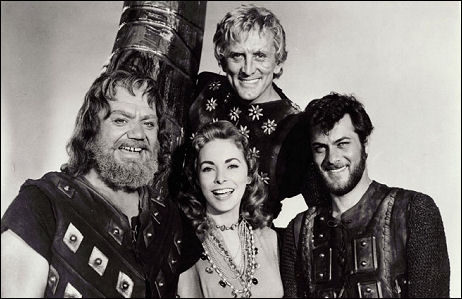
“I wouldn’t call Curtis pretentious or posturing. He’s likable, affable. He’s still looking to be flattered (as all actors are), but he doesn’t hesitate to make fun of himself, or admit to past failings or weaknesses.
“We met last Sunday at the Beverly Glen shopping center, just south of Mulholland Drive. I waved to him above the heads of several customers sitting outside a popular, packed delicatessen. Curtis waved me over and led me to the inside of a less-crowded Starbucks — fewer people, fewer stares.
“When he ordered coffee for both of us, the woman at the counter insisted on charging nothing. A small tribute to the legend. ‘Really?’ he said to her. ‘Well, thank you so much!’
“We talked about everything — politics, drug-dependency (Curtis had difficulties in this area during the ’80s), Burt Lancaster, old Hollywood, his Web site (tonycurtis.com, a venue for selling his paintings), women, new technologies, etc.
“He says there’s a large billboard of his youthful image near the corner of Sunset Boulevard and the 101 Freeway — painted by a local artist, he says. A nice little ego boost…or maybe a hint that things are coming around and old man Curtis might be in play again.
“At one point, I handed Curtis a list of his 120 films and asked him to check those he’s genuinely proud of. He checked a total of 18. He didn’t check The Vikings. He didn’t check The Outsider. He checked Houdini. Every film he made after Spartacus in 1960 up until 1968’s The Boston Strangler, he didn’t check. He checked his role as a pair of mafiosos — Louis ‘Lepke’ Buchalter in 1975’s Lepke and Sam Giancana in the 1986 TV movie Mafia Princess.
“Among his ‘notable TV guest appearances,’ Curtis checked only one — the voice role of ‘Stony Curtis; in a 1965 episode of The Flintstones.
“Curtis looks good for his age. He’s had the usual touch-ups. His teeth are perfectly white. His features are naturally weathered, but more like a man 15 to 20 years younger. His eyes have a bright, inquisitive gleam. (I’ve seen a lot less of this quality in people 30 and 40 years younger.) He has a slight pot belly. His legs are well-toned. He has a cheerful smile. ‘Thank God at my age, I’m not sick,’ he says.
“But all the applications and polishings and youthful attitudes in the world can’t make time run more slowly.
“‘Can I tell you a story, Jeffrey?’ he said, about halfway through our talk. ‘In 1948, when I was 23 or 24, when I first came out here I lived in a house on Fountain Avenue. I rented a room there. And they had a swimming pool. I had an appointment and I got on a trolley car…they were running right down the middle of the freeway back then.
“‘Then I got back, I jumped into the pool, I took a shower, got dressed and got into the car, and drove up here to meet you. That’s how quick these 50-fucking-two years have gone…quick as that.'”
In Brief
N.Y. Times op-ed columnist Gail Collins has listed four reasons why Hillary Clinton would be a great pick for Secretary of State:
1. She would not let the vice president run our foreign policy. Joe Biden is no Dick Cheney, but we just do not want to go there again. We have scars.
2. Barack Obama could live out his fantasy of following the Abraham Lincoln model and filling his cabinet with a team of rivals without having to make Sarah Palin secretary of commerce.
3. Clinton already has a supply of pantsuits sufficient to get her through six months of peace negotiations in the Middle East without coming home for a change of clothes.
4. She might do a terrific job.


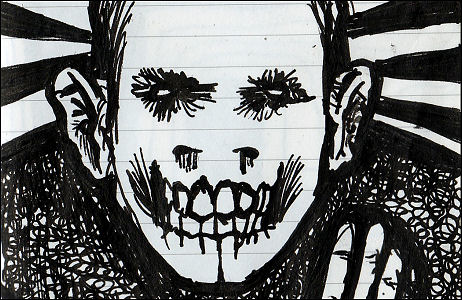 Notebook drawing by
Notebook drawing by 